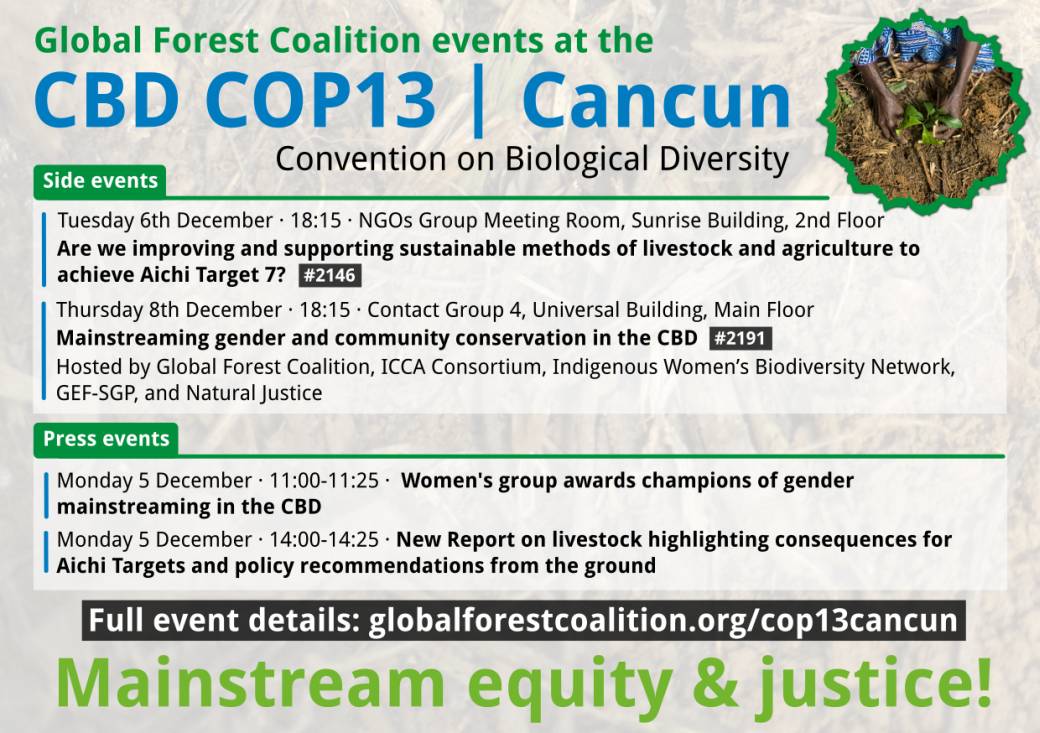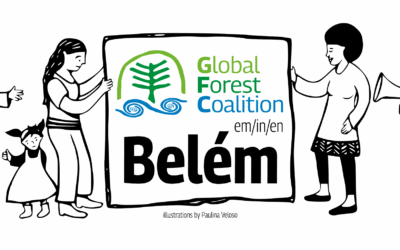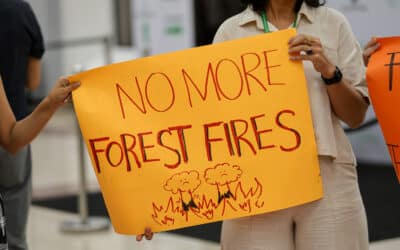Please find our flier below.
Women2030 workshop – Women2030 Latin American Regional Meeting and training-of-trainers
29 November – 1 December 2016 at the Holiday Inn Cancun Arenas (Blvd. Kukulcan KM 2.5, Zona Hotelera, 77500 Cancún, Mexico)
Press Conference – “Women’s group awards champions of gender mainstreaming in the CBD”
Monday 5 December 2016, 11:00-11:25 am local time
Press Conference – “New Report on livestock highlighting consequences for Aichi Targets and policy recommendations from the ground”
Monday 5 December 2016, 14:00-14:25 local time
Side Event – “Mainstreaming gender and community conservation in the CBD”
Thursday 8 December 2016, 18:15 local time at Contact Group 4, Universal Building, Main Floor
Community conservation initiatives are excellent examples of collective rights-based approaches to biodiversity conservation that can contribute significantly to implementing the Strategic Plan for Biodiversity 2011-2020. As holders of unique traditional knowledge, indigenous and local women play an invaluable role in such collective action and community conservation initiatives as well as in sustainable development in general. While mainstreaming gender considerations and promoting gender equality in biodiversity conservation and national plans is a key priority of the CBD (X/2; X/19; XII/7), greater awareness and recognition is needed of the special and practical contributions women in community conservation initiatives can provide to the implementation of the CBD and Aichi Biodiversity Targets, including target 11. This is particularly relevant as the COP reviews the progress of the Strategic Plan for Biodiversity 2011-2020 and achievement of the Aichi Biodiversity Targets, and deliberates how to enhance implementation including through other means and initiatives. With the aim of raising awareness on the need to mainstream gender and respect for community conservation in the work programmes of the CBD and national biodiversity strategies and action plans (NBSAPs), this side event seeks to present and debate the following:
– Why community conservation and women’s empowerment is important for the implementation of national policies around biodiversity, NBSAPs and SDGs.
– Case studies that highlight women’s contributions and rights, roles, needs and aspirations as they relate to community conservation of forests, agro-ecosystems and marine ecosystems and how that impacts on food security, biodiversity conservation, climate change, and water and energy resources.
– The importance of effective participation of women’s groups in biodiversity policy making and gender-sensitive priorities entering into NBSAPs and other national policies related biodiversity, including forest, agriculture and fisheries policies.
The event seeks to answer how recognising and supporting meaningful participation of men and women and contributions of indigenous peoples and local communities through collective rights-based approaches such as community conservation initiatives, can enhance the implementation of the Strategic Plan 2011-2020.
Speakers to be announced closer to the event
Side Event – “Are we improving and supporting sustainable methods of livestock and agriculture to achieve Aichi Target 7?”
Tuesday 6 December 2016, 18:15 local time at NGOs Group Meeting Room, Sunrise Building, Second Floor
The industrial livestock and feedstock industry have been shown by studies that they have negative impacts on climate change, biodiversity, land tenure and is a key agent of deforestation. It also displaces small farmers, grabbing their land, pesticide spraying caused numerous deaths in communities. Small farmers globally are struggling against the industrial food system and fighting for peasant agroecology and food sovereignty. Representatives from affected communities, small farmers, social movements, environmental organizations and consumer campaigns will present testimonies including with photographic evidence from different countries highlighting how unsustainable livestock and feedstock production are undermining Aichi Target 7. Alternative ways of rearing livestock paired with the methods of agroecology and promoting sustainable livestock production by 2020, including areas under agriculture and forestry, do exist and if given ample support can ensure that resources are managed sustainably hand in hand with conserving biodiversity. Panelists will also discuss proposals on reforming incentives and preventing perverse incentives for deforestation.
Speakers to be announced closer to the event




